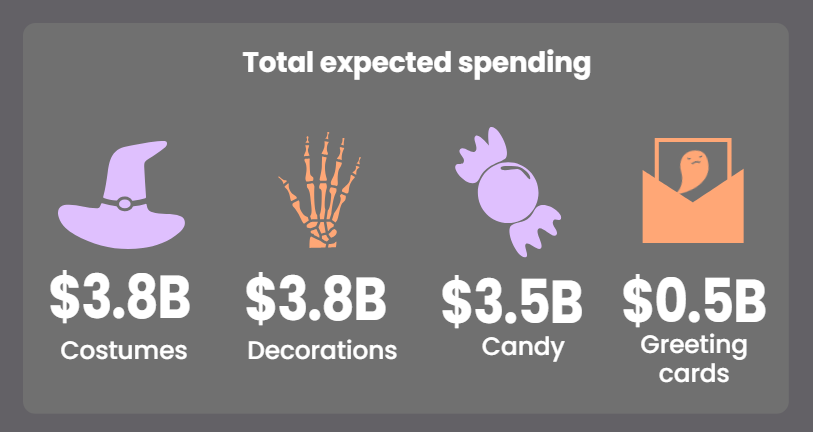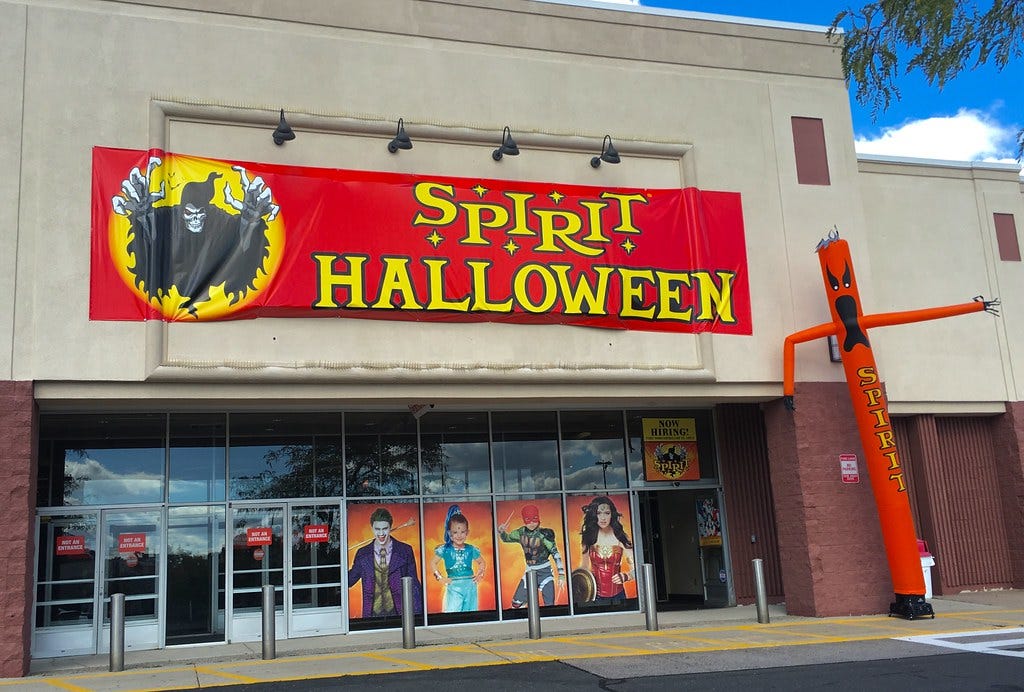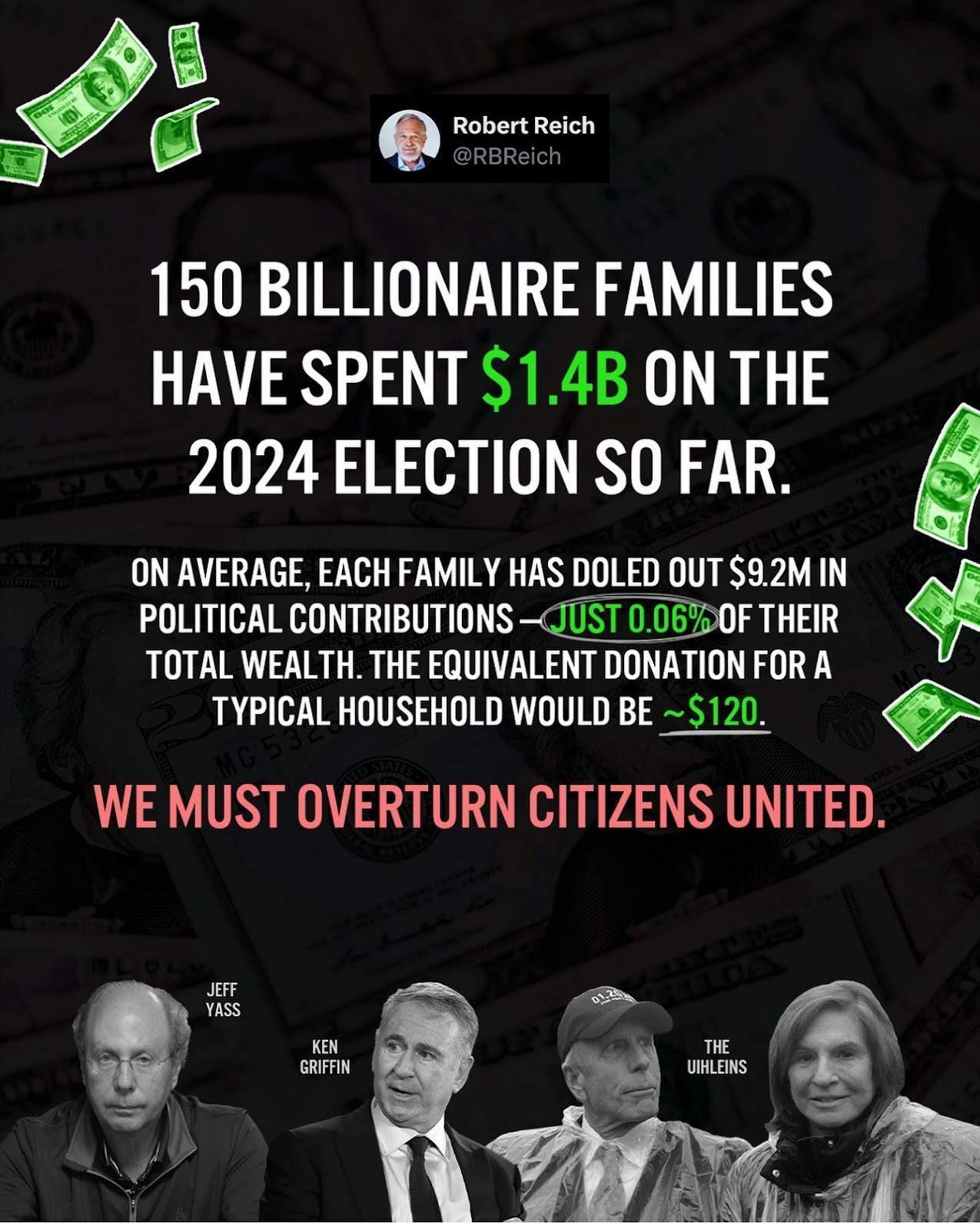Welcome to You’re Probably Getting Screwed, a weekly newsletter and video series from J.D. Scholten and Justin Stofferahn about the Second Gilded Age and the ways economic concentration is putting politics and profits over working people.
Some of us (such as the authors of this newsletter) might think about October as a time for elections and playoff baseball, but there is also a $12 billion holiday this month, and some of the companies that dominate Halloween are a microcosm of our Gilded Age economy.
Each year the National Retail Federation conducts a survey that estimates national consumer spending on Halloween and this year predicts Americans will spend about $11.6 billion on the holiday. Of that spending, the dominant categories are what you would expect, candy, costumes and decorations.
When it comes to candy, two companies - Mars and Hershey - dominate the US chocolate market with over 65% and produce much of the candy most popular at Halloween. Federal Trade Commission Chair Lina Khan, in a 2013 Time Magazine article, profiled the Chocolate Oligopoly, which include Mars, Hershey and Nestle, that dominate much of the U.S. confectionary market. As Khan details in her article, mergers and acquisitions turned what had been a mostly regional industry into one controlled by conglomerates.
“The bigger players began eating up their smaller rivals. Hershey bought up Reese’s in 1963, a prelude to later purchasing Twizzlers and Almond Joy. Nestle followed suit, snapping up brands like Goobers, Baby Ruth, and Wonka Bars.” - Lina Khan
The Chocolate Oligopoly has not been content to rule over our favorite Halloween treats though, as some have become massive conglomerates. Mars is the largest vet provider in the country owning 45% (over 3,000) of the vet clinics in the US. Mars has also proposed a $36 billion acquisition of Kellanova, a recent spun-off division of Kellogg’s that makes snacks like Pringles and Poptarts, that would be the largest packaged food company merger since Kraft and Heinz in 2015. Nestle’s tentacles reach all across the grocery store from snacks to dairy to dog food and more, and up until a couple of years ago they even owned a life insurance company.
When it comes to where people buy their Halloween candy, costumes and decorations, discount stores (37%), specialty stores (33%) and the web (33%) are the most popular places. No one is quite as visible as Spirit Halloween, which captures a third of specialty store sales at 1,400 locations, and an online store, often utilizing abandoned big box stores.
One one hand, Spirit helps fill an otherwise empty space, but is also a reflection of the retail destruction that major retailers have left in communities large and small in recent decades. Spirit has also made use of exclusive deals on merchandise that as it continues to grow will only strengthen its grip over the market and Halloween might just be the start as the company recently announced Spirit Christmas. The seasonal nature of the company also creates even more temporary jobs in a labor market that has become increasingly consolidated leading to low wages, less worker freedom and more and more precariousness.
Of the online sales, Amazon dominates with over 40% of Halloween sales made on the web. The Big Tech giant is the subject of an FTC antitrust lawsuit that alleges Amazon protected its monopoly by squeezing sellers on its vast marketplace and favoring its own services. Of the sales at big box retailers the key player is Walmart, whose monopoly power increases poverty according to a new analysis.
None of this is to shame consumers, we cannot shop our way out of our monopoly problem. This is more to demonstrate that once you see consolidation in one place you start to see it everywhere else. Fortunately we can do something about this and make sure that when you go trick or treating, you are not getting screwed.
YOU’RE PROBABLY (ALSO) GETTING SCREWED BY:
Billionaires Influencing the Elections
Billionaires pumping in millions of dollars to influence this election. Three people — Elon Musk, Miriam Adelson and Dick Uihlein — put a combined $220 million into groups supporting Donald J. Trump in July, August and September.
Just a quick reminder, billionaires aren’t focused on things like universal healthcare…
Walgreens
You know how when Walgreens came to town it closed local independent pharmacies? What happens then when Walgreens closes?
Walgreens announced they’re closing 13% of their stores, that’s around 1,200 stores nationwide.
PBMs
Speaking of lost pharmacies, Minnesota Governor Tim Walz unveiled the Harris-Walz Rural Policy plan with a focus on protecting independent pharmacies.
Meatpackers
2024 continues to be a weird year. Welcome to the anti-monopoly movement… McDonalds?
Yes, McDonalds is suing the top meat packers for allegedly colluding to inflate the price of beef. This should be something to watch closely.
SOME GOOD NEWS
New Anti-Monopoly Pod Cast
BIG is teaming up with the American Prospect's Dave Dayen to do a podcast on monopolies and business.
Federal Trade Commission Putting in the Work
The U.S. Federal Trade Commission adopted a final rule on Wednesday requiring businesses to make it as easy to cancel subscriptions and memberships as it is to sign up.
The "click to cancel" rule requires retailers, gyms and other businesses to get consumers' consent for subscriptions, auto-renewals and free trials that convert to paid memberships. The cancellation method must be "at least as easy to use" as the sign up process.
USDA
First, the USDA announced its Seed Competition Framework, which will promote research access with the goal of bettering seed system diversity.
Second, USDA released its Interim Competition and Fair Practices in Meat Merchandising report, which despite a lack of cooperation by corporations, found that retailers, distributors, and packers are using unfair business practices and may be in violation of the Packers and Stockyards Act (P&S Act).
Third, USDA announced its fifth and final P&S Act rulemaking aimed at addressing price transparency in the cattle market. Farm Action has continuously urged the department to strengthen the historic P&S Act so that it levels the playing field for farmers and ranchers.
BEFORE YOU GO
Before you go, I need two things from you: 1) if you like something, please share it on social media or the next time you have coffee with a friend. 2) Ideas, if you have any ideas for future newsletter content please comment below. Thank you.
Break ‘Em Up,
Justin Stofferahn







